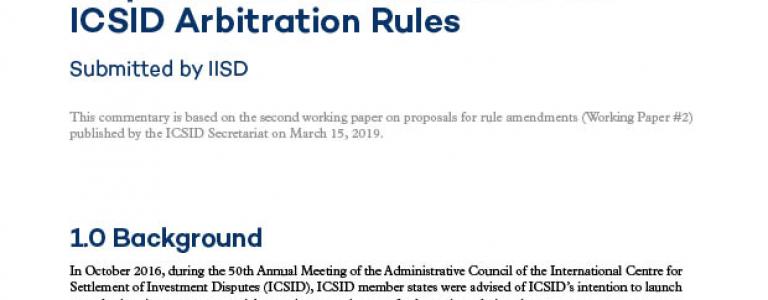Summary Comments to the Proposals for Amendment of the ICSID Arbitration Rules
This commentary focuses on select aspects of the ICSID Secretariat's March 15, 2019 draft proposals for amendment of the ICSID Arbitration Rules.
Key Messages
- This commentary focuses on select aspects of the proposed amendments to the Arbitration Rules of the International Centre for Settlement of Investment Disputes (ICSID) that merit further development, as well as on some key aspects not covered in the ICSID Secretariat's March 15, 2019 draft.
- The proposed amendments signal an effort to improve the procedural rules governing ICSID arbitration, but fail to appropriately address many concerns expressed by states and other stakeholders and fall short of promoting meaningful reform of investor–state dispute settlement (ISDS).
- In the ICSID Secretariat's analysis, many priority reforms identified by states may not be achieved through amendment of the ICSID Arbitration Rules. If this analysis is accurate, ICSID member states should also consider amending the Convention on the Settlement of Investment Disputes Between States and Nationals of Other States (the ICSID Convention).
On March 15, 2019, the Secretariat of the International Centre for Settlement of Investment Disputes (ICSID) issued a working paper (WP #2) in the context of a rule amendment process launched in October 2016.
The ICSID Secretariat expressed its hope to achieve broad consensus on the current draft so that a final proposal can be sent to members, allowing them to vote on the amendments in October 2019. The secretariat also welcomed comments on WP #2 by states and the public by June 10, 2019.
This document provides summary comments to WP #2, prepared by IISD. The commentary focuses exclusively on select aspects of the proposed amendments to the ICSID Arbitration Rules and to the Arbitrator Declaration that merit further development. It also addresses some key aspects not covered in the current draft.
The proposed amendments fail to appropriately address many concerns expressed by states and other stakeholders with respect to treaty-based investor–state arbitration. While signalling an effort to improve the procedural rules governing ICSID arbitration, they fall short of promoting meaningful reform of investor–state dispute settlement (ISDS).
Many priority reforms identified by states may not be achieved through amendment of the ICSID Arbitration Rules, according to the ICSID Secretariat. If the secretariat's analysis is considered accurate, ICSID member states should, in parallel to the rule amendment process, consider amending the Convention on the Settlement of Investment Disputes Between States and Nationals of Other States (the ICSID Convention).
Additional downloads
You might also be interested in
Revisiting Investment Contracts Efficiency
IISD's Josef Ostřanský talks about investment contracts and treaties with Tanzanian Broadcasting Corporation.
IISD's Best of 2024: Publications
As 2024 draws to a close, we revisit our most downloaded IISD publications of the year.
Why the Energy Charter Treaty Modernization Doesn't Deliver for Climate
The Energy Charter Conference adopted the "modernized" Energy Charter Treaty (ECT) on December 3, 2024. IISD's Lukas Schaugg explains what the modernization does, when it will enter into force, its tension with EU law, and why the reformed ECT can still hinder climate policies.
The Responsible Agricultural Investment Tool for Agribusiness and Case Studies
This report summarizes a collaboration to support agribusinesses in complying with principles of responsible investment in agriculture and food systems.
